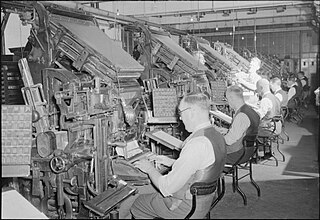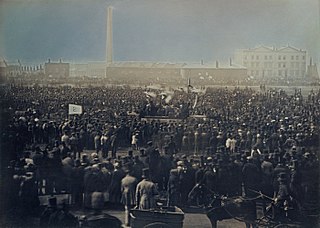Related Research Articles

The 1830s was a decade of the Gregorian calendar that began on January 1, 1830, and ended on December 31, 1839.

The history of British newspapers dates to the 17th century with the emergence of regular publications covering news and gossip. The relaxation of government censorship in the late 17th century led to a rise in publications, which in turn led to an increase in regulation throughout the 18th century. The Times began publication in 1785 and became the leading newspaper of the early 19th century, before the lifting of taxes on newspapers and technological innovations led to a boom in newspaper publishing in the late 19th century. Mass education and increasing affluence led to new papers such as the Daily Mail emerging at the end of the 19th century, aimed at lower middle-class readers.

Chartism was a working-class movement for political reform in the United Kingdom that erupted from 1838 to 1857 and was strongest in 1839, 1842 and 1848. It took its name from the People's Charter of 1838 and was a national protest movement, with particular strongholds of support in Northern England, the East Midlands, the Staffordshire Potteries, the Black Country, and the South Wales Valleys. The movement was fiercely opposed by government authorities who finally suppressed it.

The Tolpuddle Martyrs were six agricultural labourers from the village of Tolpuddle in Dorset, England, who, in 1834, were convicted of swearing a secret oath as members of the Friendly Society of Agricultural Labourers. They were arrested on charges under an obscure act during a labour dispute against cutting wages before being convicted in R v Loveless and Others and sentenced to penal transportation to Australia. They were pardoned in 1836 after mass protests by sympathisers and support from Lord John Russell and returned to England between 1837 and 1839.

Richard Carlile was an important agitator for the establishment of universal suffrage and freedom of the press in the United Kingdom.
Owenism is the utopian socialist philosophy of 19th-century social reformer Robert Owen and his followers and successors, who are known as Owenites. Owenism aimed for radical reform of society and is considered a forerunner of the cooperative movement. The Owenite movement undertook several experiments in the establishment of utopian communities organized according to communitarian and cooperative principles. One of the best known of these efforts, which were largely unsuccessful, was the project at New Harmony, Indiana, which started in 1825 and was abandoned by 1829. Owenism is also closely associated with the development of the British trade union movement, and with the spread of the Mechanics' Institute movement.

William Lovett was a British activist and leader of the Chartist political movement. He was one of the leading London-based artisan radicals of his generation.

The Kingston Whig-Standard is a newspaper in Kingston, Ontario, Canada. It is published four days a week, on Tuesday and Thursday to Saturday. It publishes a mix of community, national and international news and is currently owned by Postmedia. It has ISSN 1197-4397.

George William MacArthur Reynolds was a British fiction writer and journalist.

Henry Hetherington was an English printer, bookseller, publisher and newspaper proprietor who campaigned for social justice, a free press, universal suffrage and religious freethought. Together with his close associates, William Lovett, John Cleave and James Watson, he was a leading member of numerous co-operative and radical groups, including the Owenite British Association for the Promotion of Co-operative Knowledge, the National Union of the Working Classes and the London Working Men's Association. As proprietor of The Poor Man's Guardian he played a major role in the "War of the Unstamped" and was imprisoned three times for refusing to pay newspaper stamp duty. He was a leader of the "moral force" wing of the Chartist movement and a supporter of pro-democracy movements in other countries. His name is included on the Reformers' Memorial in Kensal Green Cemetery.

The Northern Star and Leeds General Advertiser was a chartist newspaper published in Britain between 1837 and 1852, and best known for advancing the reform issues articulated by proprietor Feargus O'Connor.
Police Gazette, or some variation thereof has been the title of several magazines:

The Register, originally the South Australian Gazette and Colonial Register, and later South Australian Register, was South Australia's first newspaper. It was first published in London in June 1836, moved to Adelaide in 1837, and folded into The Advertiser almost a century later in February 1931.
John Cleave was a British, London based Chartist leader, a printer and newspaper publisher.
The Rotunda radicals, known at the time as Rotundists or Rotundanists, were a diverse group of social, political and religious radical reformers who gathered around the Blackfriars Rotunda, London, between 1830 and 1832, while it was under the management of Richard Carlile. During this period almost every well-known radical in London spoke there at meetings which were often rowdy. The Home Office regarded the Rotunda as a centre of violence, sedition and blasphemy, and regularly spied on its meetings.

The Reform movement in Upper Canada was a political movement in British North America in the mid-19th century.
The history of journalism in the United Kingdom includes the gathering and transmitting of news, spans the growth of technology and trade, marked by the advent of specialised techniques for gathering and disseminating information on a regular basis. In the analysis of historians, it involves the steady increase of the scope of news available to us and the speed with which it is transmitted.

Taxes on knowledge was a slogan defining an extended British campaign against duties and taxes on newspapers, their advertising content, and the paper they were printed on. The paper tax was early identified as an issue: "A tax upon Paper, is a tax upon Knowledge" is a saying attributed to Alexander Adam (1741–1809), a Scottish headmaster.

The Nottingham Mercury was a newspaper printed in Nottingham.
References
- ↑ Edward Jacobs, 'The Politicization of Everyday Life in Cleave's Weekly Police Gazette (1834-36)', Victorian Periodicals Review, 40:3 (2008), pp. 225-247
- ↑ Carolyn Reitz, 'Cleave's Weekly Police Gazette', Dictionary of nineteenth-century journalism in Great Britain and Ireland, ed. Laurel Brake and Marysa Demoor, Academia Press, 2009